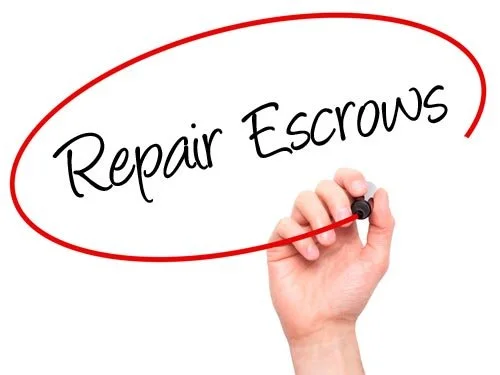Seller Concession
Called seller assists or seller contributions, seller concessions are closing costs that the seller agrees to pay in order to reduce the cash the buyer needs to bring to the closing table. In a buyer's market, these concessions are often granted in order to get the house sold.
Conventional
The limit for conventional loans depends on how much you're putting down:
Down payment less than 10%, the seller can contribute up to 3%.
Down payment 10 – 25%, the seller can contribute up to 6%.
Greater than 25%, the seller can contribute up to 9%.
FHA
Interested parties can contribute up to 6%
VA
Interested parties can contribute up to 4%
USDA
Interested parties can contribute up to 6%
NON-QA
Specific to program
Funds are used for required repairs that cannot be completed before closing. Funds come from the buyer and/or seller and are not rolled into the mortgage. For situations where that is needed, rehab loans are available.
Non-Weather-Related Repairs
Only repairs required on appraisal report are allowed.
Repair estimates to be provided from licensed professional(s).
The repairs cannot adversely affect the safety, soundness, or habitability of the premise.
Cost to complete does not exceed 10% of the “as completed” value or specific agency maximum.
Title insurance will not be impaired or adversely affected during and after the completion period.
Upon completion, appraiser must performs a final inspection.
Repairs must be completed within 10 calendar days.
120% of the repair bids must be collected.
Weather Related Escrows
Only repairs required on appraisal report are allowed.
Repair estimates to be provided from licensed professional(s).
The repairs cannot adversely affect the safety, soundness, or habitability of the premise.
Cost to complete does not exceed 10% of the “as completed” value or specific agency maximum.
Title insurance will not be impaired or adversely affected during and after the completion period.
Upon completion, appraiser must performs a final inspection.
FHA
Total repair cannot exceed $5,000 ($10,000 if HUD REO) or it must be completed as a 203k. The $5,000 ($10,000 if HUD REO) is the repair cost and does not include the additional percentage requirement.
Not HUD REO: 150% of the estimated repair cost must be escrowed.
HUD REO: 110% of the estimated repair cost must be escrowed.
The sales contract must include the repairs and the 110%.
Conventional
120% of the repair bid must be collected.
VA
150% of the repair bid must be collected.
USDA
120% of the re pair bid must be collected. The cost of the work cannot exceed 10% of the final loan amount.
Escrow Holdback
Can only be for repairs that will not affect the livability, safety, or structural integrity of the property or affect the ability to obtain a Certificate of Occupancy on new or proposed construction. Escrow holdbacks can be set up due to the appraisal being “subject to” or due to the terms of the sales contract.
Eligible Repairs – New Construction
Incomplete items that do not affect the ability to obtain a Certification of Completion or Occupancy Certificate.
Eligible Repairs – Existing construction include, but are not limited to:
Exterior Painting.
Replacement of carpet or flooring.
Minor exterior plumbing leaks.
Replacement of window glass and/or screens.
Replacement of doors, fixtures, or rotted exterior wood.
Garage door repairs.
Other “wear and tear” items at the discretion of the underwriter.
Ineligible Repairs new and existing construction:
Conditions that affect the safety, livability or marketability of the property.
Structural repairs.
Incomplete work may not prevent the issuance of a Certificate of Occupancy, if applicable.
Plumbing fixtures.
Any scraping of lead based paint.
Installation or repair of a swimming pool.
Completion of a partially finished addition or renovations.
Well/Septic repairs.
Roofing, including active roof leaks and curled or cupped roof shingles.
Extensive electrical or plumbing repair.
Foundation or structural repairs, including cracks or settlement in the foundation or water seepage.
Termite damage (excluding minor repairs).
Environmental hazards.
Required Documentation for all Escrow Holdbacks
Document reason the repairs cannot be done prior to closing.
A certified contractor/vendor/appraiser (not the borrower or property seller) must provide a written estimate itemizing all incomplete work and the cost to complete each item. USDA requires a signed contract between the borrower and the contractor.
Fully executed Escrow Holdback Agreement.
Closing Disclosure evidencing escrow of funds at closing.
Final inspection/documentation of completion of repairs as required by loan type referenced below. If minor repairs are performed by the borrower receipts will be required.
Conventional Repair Escrow
Allowed for completion of minor repairs or deferred maintenance items that do not affect the safety, soundness, or structural integrity of the property.
Completion Term
All repairs must be completed within 180 calendar days
Escrow Amount
The cost of completing the improvements must not represent more than 10% of the “as completed” appraised value of the property.
An escrow for the postponed improvements must be established with funds equal to 120% of the estimated cost for completing improvements.
Evidence of Completion:
If the appraisal is completed “subject to” repairs or alterations, the appraiser must perform a final inspection and complete the Certificate of Completion report on Form 442. The Certificate of Completion must:
Be completed by the appraiser, and
State the improvements were completed in accordance with the requirements and conditions in the original appraisal.
Be accompanied by photographs if new or proposed construction. If existing property photographs are only required if the ones that accompanied the original appraisal report are no longer representative of the completed property.
If the appraisal is completed “as is”, the borrower must verify that the repairs have been completed to his/her satisfaction and authorize release of the escrowed funds.
Certification from a qualified professional on a company form or letterhead. A qualified professional may be a:
Professionally licensed, bonded, registered engineer; or
Licensed Home inspector; or
Appropriately registered/licensed trades person.
If the borrower performed the minor repairs, receipts for the items needed to make the repairs and the fee inspection is required.
Rapid Appreciation & Property Flipping
All transactions in which a property is purchased and resold quickly for a significant profit must be scrutinized closely for misrepresentation, which usually includes property value, property information, down payment, hidden transaction terms, or borrower qualifications. Chain of title history must be reviewed and title commitment ownership compared against the seller on the purchase agreement, the appraisal owner, and occupant information, and the Closing Disclosure. Parties in a trust or LLC must be identified to ensure they are an arms-length transaction between buyer and seller. The seller of the property indicated on the contract of sale must be the same as the owner of record.
Required for Homes Owned Less than 180-days
Conventional & VA
Provide list of upgrades for appraiser to note in report.
Arm's-length
FHA
Resales occurring < 90 days after acquisition:
Not permitted unless the seller is HUD or a bank.
Resales occurring between 91 days and 180 days after acquisition:
A second appraisal must be obtained if the resale price is 100% or more over the price paid by the seller to acquire the property. I will pay for the second appraisal.
Contract must be dated after 91st day.
USDA
If the increase is >20% the appraiser must supply interior photos of the renovations and comment on the cost of the repairs renovations and likely contribution to the value increase.
Arms-length.
Arms-length: A transaction in which the buyers and sellers of a product act independently and have no relationship to each other. The concept of an arm's length transaction is to ensure that both parties in the deal are acting in their own self interest and are not subject to any pressure or duress from the other party.













